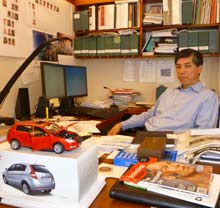AmericanMadeHeroes.com
We honor America's best manufacturers keeping America's future strong.
|

|
|
Shih, who is 57, was a veteran manager at IBM and Eastman Kodak before coming to Harvard in 2007. From his fourth-floor office in a building he shares with marketing and finance professors, he says that now he is able to understand issues that he "couldn't quite articulate" when he was at Kodak. For example, he says, he once investigated building a highly automated $400 million plant to build CCD sensors for digital cameras in Kodak's industrial park in Rochester, New York. But he soon realized that the equipment to make the sensors was available only in Japan, where the video-camera industry had demanded the devices. Kodak could have imported the equipment, but Shih worried that when glitches occurred he would have to wait weeks to get a technician to Rochester, while Japanese competitors could have one on site in minutes. He ultimately decided to form a joint venture with a Japanese company to build a factory in Japan. Pisano and Shih suggest that both industry and government could make changes to restore American innovation capabilities. In the private sector, they argue, companies should spend more on creating products and less on marketing; articulate a credible long-term strategy to Wall Street and stick to it; accept that R&D outcomes are hard to predict; reinvigorate basic research; and add a committee dedicated to science and technology to each board of directors. For federal policy, they warn against trying to pick winners among existing companies and industries. (They opposed the auto bailout, although Shih now says it appears to have succeeded, in part by accelerating a needed bankruptcy). They say the federal government should expand funding of basic research and applied research that affects many companies. For example, the Human Genome Project and NASA's support of work on composite materials have boosted many companies. They also urge funding for research on "grand challenges" like combating climate change, ensuring access to potable water, and developing substitutes for coal; such research, they say, fosters collaboration among academia, government, and industry, creating a new commons. Shih recently told a congressional hearing that the Pentagon should consider the impact on innovation as it cuts its budget. To illustrate the importance of maintaining a U.S. innovation ecosystem even when an innovation's value isn't apparent immediately, Shih points out that rechargeable batteries didn't seem very important to U.S. companies when the University of Texas licensed lithium-ion technology to Sony two decades ago; hardly anyone in the United States was making consumer electronics. But after Sony introduced the technology in its Walkman in 1991, other Asian consumer-electronics companies also developed rechargeable-battery technology. Later, as rechargeable batteries became an important component of laptop computers, the battery makers honed their skills with manufacturers, which in turn transferred expertise with small consumer electronics into building laptops in Asia. Today, with hybrid and electric cars on the rise, manufacturers in Japan, Korea, and China have a big head start on the technology behind those vehicles. |











Click photo to for info about The China Commission. |
|

Alexander Hamilton |
"Not only the wealth, but the independence and security of a country, appear
to be materially connected with the prosperity of manufacturers. Every nation ... ought to endeavor to possess within
itself all the essentials of a national supply. They comprise the means of subsistence, habitation, clothing and
defense ... The expediency of encouraging manufactures in the United States, which was not long since deemed very
questionable, appears at this time to be pretty generally admitted."
-- Alexander Hamilton ... an American Made Hero! |
... or simply send E-mail to Comments@AmericanMadeHeroes.com
| American Made Heroes (AMH) is a unique non-partisan organization with absolutely no political preference or affiliation. Our mission is primarily focused on raising to higher public esteem our proud United States of America domestic manufacturers. American Made Heroes loudly applauds and salutes the growing group of well credentialed American domestic manufacturers who proudly continue to manufacture here in the USA and deserve special recognition and respect. American Made Heroes (AMH) also recognizes and salutes those individuals who advocate for the implementation of policy solutions to that support our domestic manufacturers. |
AmericanMadeHeroes.com Copyright © 2010/2011/2012 All Rights Reserved



